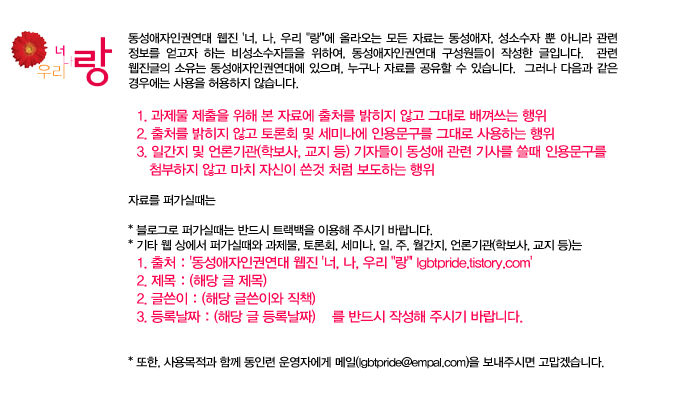인도 수도 뉴델리에서 동성 간 성행위를 금지한 법률이 뒤집혔다는 소식에 인도 LGBT 활동가들은 중요한 승리라며 환호했다. 또한 이 소식은 아시아와 전세계에 동성애혐오를 심어놓는 데서 식민주의의 유산을 상기시켰다. 이번에 위헌 판결이 난 법률은 대영제국 식민지 정부에 의해 도입된 것이다. 식민지 정부는 식민 지배하에 있는 후진적 민족들에게 소위 "문명"의 이점을 제공한다며 식민 통치를 정당화하려 했다. 19세기 말과 20세기 초에 미국은 영국을 따라서 다른 민족의 섹슈얼리티를 규제하려고 했다. 이런 노력 속에서 식민 정책과 신식민지 정책, 기독교, 특히 프로테스탄트 도덕주의, 그리고 심리학과 사회학 분야에서 서구의 통속 과학의 통찰력이 우수하다는 생각들이 결탁했다. 이런 요소들이 함께 작용해 근대 서구의 성적 도덕주의가 그들이 지배하려는 민족들에게 부과된 것이다. 미국이 다른 사회들이 미국 종교 우파의 입장에 부합하는 반낙태 정책과 성행위 승낙연령 정책을 채택하느냐에 따라 "원조"를 결정하는 정책을 추구하면서 문화적 지배를 위한 이런 노력은 계속되고 있다.
이 사실을 언급하는 이유는 아시아에서 동성애혐오가 서구 지배에 산물이라는 점을 분명히 하기 위함이다. 동성애혐오를 들여놓는 일은 대체로 아주 효과적이었다. 예를 들면, 인도에서는 서구의 영향을 받은 기독교 집단뿐만 아니라 힌두교 전통주의 정당들도 LGBT 해방에 반대한다. 양측은 모두 동성애와 동성애자 해방이 서구로부터 수입된 것이며 바람직스럽지 못한 "세계화"의 일환이라고 주장한다. 오늘날 LGBT 해방을 위한 추동력의 일부가 과거 서구의 도덕주의적 규제를 철폐하려는 서구 운동으로부터 비롯한 것은 분명한 사실이다. 한국이나 중국에서 벌어지는 동성애자 자긍심 축제는 이를 잘 보여준다. 그러나 사람들이 보지 못하는 것은 이런 투쟁에 반대하는 동성애혐오 그 자체가 지난 시대 서구적 세계화에 의해 심어진 것이라는 점이다.
시카고신학대학은 동성애혐오에 확고히 반대하는데 동성애혐오가 수많은 사람들에게 커다란 상처를 주는 기독교 정신의 왜곡이라고 믿기 때문이다. 내가 한국이나 필리핀, 대만 또는 일본을 여행할 때면 언제나 수입된 서구의 동성애혐오로 인해 이런 사회들이 입은 상처를 마주치게 된다. 서구 프로테스탄트 기독교인으로서 나는 동성애혐오의 세계화에 맞서 투쟁하는 이들을 도울 의무가 있다고 믿고 있다.
이것은 기독교, 특히 개신교 목사들이 미국 종교 우익들이 만들어낸 주장과 구호를 이용해 자신들의 도덕주의적 견해를 한국 사회와 정치에 강제하기 위해 목소리를 높이는 한국에서 특히 그렇다. 그들의 견해는 진정한 기독교 정신과 아무런 관련이 없다. 또한 '왕의 남자'와 '쌍화점' 같은 한국 사극영화들이 암시하듯이, 그것은 한국의 문화적 전통과도 아무런 관련이 없다. 한국에서 동성애혐오에 맞선 투쟁은, 다른 아시아 국가들에서와 마찬가지로 기독교 정신을 곡해해 문화적․정치적 지배의 근거로 삼으려는 신식민지주의적 사고방식이 조장하는 동성애혐오의 세계화에 맞선 투쟁이다. 나의 동료인 서보명 교수와 나는 한국의 LGBT 인권단체들과 함께 신식민주의 형태의 세계화가 조장하는 동성애혐오에 맞선 투쟁에서 연대할 기회를 갖게 된 것을 기쁘게 생각한다.
테드 제닝스 _ 시카고신학대학
Homophobia as western cultural domination
The news of the overturning of the law against homosexual sex acts in the capital of India was greeted as an important victory by LGBT activists in India. But it was also a reminder of the legacy of colonialism in the imposition of homophobia in Asia and around the world. The specific law that was overturned had been imposed by the British colonial government as it sought to legitimate colonial rule as bringing the advantages of what it termed “civilization” to backward peoples under its dominion. Toward the end of the 19th century and into the 20th century Britain was followed by the United States in the attempt to regulate other people’s sexuality. In this attempt there was an alliance between colonial and neo-colonial policy, Christian, especially protestant moralism, and the presumed superior insight of western popular science in the areas of psychology and sociology. These factors worked hand in hand to impose modern western sexual moralism upon the nations that it sought to control. This attempt at cultural domination has not disappeared as the United States has sought to make its “aid” contingent on other societies adopting anti-abortion policies and age of consent for sexual activity policies that correspond to the views of the religious right in the United States.
The point of mentioning this is to make clear that homophobia in Asia is a product of western domination. This imposition has often been quite effective. In India, for example, lgbt liberation is opposed not only by western influenced Christian groups but also by Hindu traditionalist political parties. Both sides claim that homosexuality and gay liberation is imported from the west and is part of an undesirable “globalization”. Now it is certainly true that some of the impetus for lgbt liberation comes from movements in the west to overthrow the moralistic restrictions of the western past. Gay pride celebrations that occur in China as well as Korea are important symbols of this. But what is lost sight of is that the homophobia that is opposed by these struggles was itself imposed by western globalization of an earlier era.
At the Chicago Theological Seminary we are committed to combating homophobia because we believe that it is a distortion of Christianity that has caused great harm to millions of people. When I travel to Korea or the Philippines or Taiwan or Japan I am always confronted by the ways these societies have been victimized by the importation of western homophobia. As a Western protestant Christian I believe that I have an obligation to assist those who struggle against the globalization of homophobia.
This is especially true in Korea where vocal Christian, usually protestant, pastors use the arguments and slogans created by the American religious right to seek to impose their moralistic views on Korean society and polity. These views have nothing to do with authentic Christianity. And, as Korean historical drama movies like the King’s Man (wang-ui namja) and ssang hwa jeom suggest, they have nothing to do with Korean cultural traditions either. The struggle against homophobia in Korea, as in other nations in Asia, is a struggle against the globalization of homophobia fostered by a neo-colonial mind set that has perverted Christianity into a rationale for cultural and political domination. My colleague, Seo BoMyung gyo su nim, and I are happy to have the opportunity to be in solidarity with the Korean LGBT Human Rights group in its struggle to overcome the homophobia fostered by neo-colonial forms of globalization.

